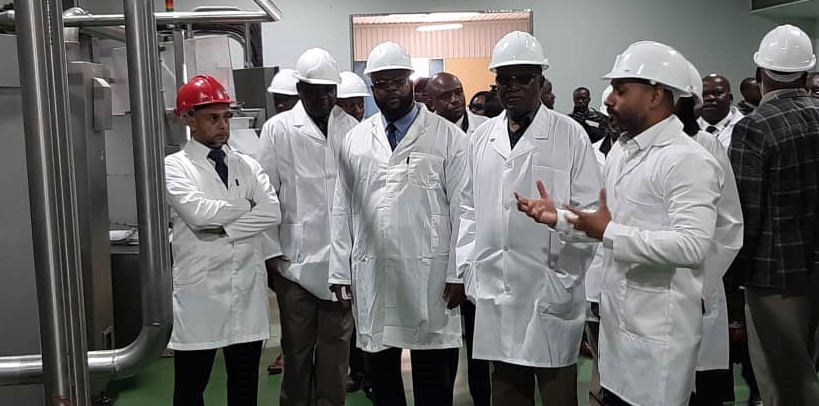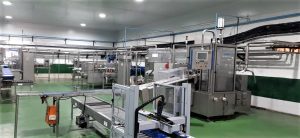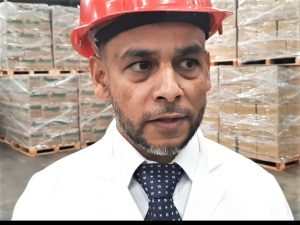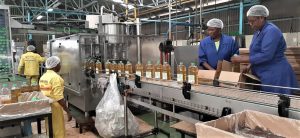
ZCDC commits to breathe new life in its CSI projects in Manicaland
October 18, 2023Willowton Group Zimbabwe speaks on US$6 mill margarine plant near completion
November 9, 2023US$6 mill Willowton Group Zimbabwe margarine factory to be operational by end of December

(L-R) Willowton Group Zimbabwe project manager Sunil Kumar explaining about the new margarine plant to the Special Advisor to the President on Monitoring Implementation of Government Programmes and Projects, Dr Joram Gumbo and the Minister of State for Manicaland Provincial Affairs and Devolution Advocate Misheck Mugadza during a tour of the new factory soon to be opened in Mutare.
…100 jobs to be created at maximum production capacity
Ngoni Dapira
THE once moribund Karina Textiles plant is now once again the pinnacle of Nyakamete Industrial Site in Mutare following massive investments by Willowton Group Zimbabwe. The company is a subsidiary of the Willowton Group South Africa which was formed in 1970 as a family business.
Karina Textiles, which was the country’s sole manufacturer of knitting yarn, used to employ over 600 workers in its prime years, but applied for liquidation in 2013 and eventually shut down its operations due to a myriad of challenges that backdated to the 2008 hyper inflationary period in the country.

Mega Market director Shiraan Ahmed talking to the ZanuPF Manicaland chairperson Tawanda Mukodza during the tour.
Under the hammer in liquidation, the plant eventually got purchased by the fast-moving consumer goods (FMCG) distribution company Mega Market through a Willowton Group Zimbabwe consortium arrangement. Most people in Mutare were skeptic of anything lucrative materializing from the deal and had lost hope of one day ever seeing a worthy venture that would surpass the prestige of Karina Textiles and the paper making manufacturing giant Mutare Board and Paper Mill (MBPM) that was first to close down in 2011.
However, present –day, history is being made and by end of December this year, a US$6 million margarine factory will open its doors at the plant as an additional venture to the Willowton Group Zimbabwe’s soap and cooking oil manufacturing factory that is already operational at the plant since 2016.

The high-tech machinery at the Willowton Group Zimbabwe margarine factory.
The construction woks of the project which started early last year are massive. 10 huge palm oil storage tanks that range from 70 to 200 tonnes were built by local artisans, whilst the manufacturing machinery is state-of-the-art in efficiently maximizing production capacity.
The leading producer of edible oil and soaps in Zimbabwe said it now wants to penetrate the margarine market and compete with reputable brands such as Buttercup which has dominated the market for many years in Zimbabwe and Africa at large. “Competition is healthy and only makes everything better. It will also push us to make a better quality product and make our competitors more competitive. We believe in the quality of our margarine products that is why all our products are ISO (International Organization for Standardization) certified,” said Suleman Darsot the Willowton Group Zimbabwe managing director.
This was said during a project site tour of the manufacturing plant by the special advisor to the President on Monitoring Implementation of Government Programmes and Projects, Dr Joram Gumbo last week Thursday. He was accompanied by the Minister of State for Manicaland Provincial Affairs and Devolution Advocate Misheck Mugadza.
In addition, Darsot said by the first quarter of operation they intend to reach maximum production capacity and double the number of employees from the 50 they anticipate to start operating with. This would increase employment to 100.

Suleman Darsot
“We are hoping to produce at the beginning 50 tonnes of margarine per day between all our sizes, from 500 grams up to 1kg. We are at 95 percent completion and the only thing left is our refrigeration, so once this is complete, in the next two weeks we will start our trial runs. Hopefully, we will have our margarine on the shelves by Christmas (December), if not, in the first week of January,” he said.
The margarine plant will manufacture two brands Romi and D’lite. He said their margarine brands currently on shelves in retail outlets are imports from South Africa. Manufacturing locally leads to reduced pricing of their brands compared to the imports from South Africa says Darsot.
Darsot said the rapidly expanding market for food, as well as other commodities in Africa, made the investment in this plant, as well as further investments, a priority.
He however admitted that there are some letdowns on operational viability where the government can help improve the ease of doing business for manufacturing companies, but in broad spectrum applauded government for an enterprising operating environment for their line of business.
“The operating environment is very conducive in Zimbabwe. Our production figures in the last four years have been going up. In our sector we are growing and the business environment is allowing this growth,” said the Willowton Group Zimbabwe managing director.
Dr Gumbo said the investment by Willowton Group Zimbabwe is a flagship project that brings new-age technology industry to Manicaland to replace the old.
“The development here is testimony of the synergies between government and the private sector in propelling the country towards an industrialised status. We are seeing re-industrialisation taking shape after a company that used to operate here closed. The establishment of the margarine plant is a positive step towards industrialization and self-sufficiency,” said Dr Gumbo.

Dr Gumbo (extreme left) and the Manicaland resident Minister Advocate Mugadza (second from left) checking the quality of the laundry soap at Willowton during the tour.
He added that the investment would also bolster opportunities for local soya and sunflower farmers. Dr Gumbo castigated the current 100 percent import of crude oil and indicated that government will need to come up with means and ways of encouraging local farmers to farm and produce the palm oil raw material to meet the demand of local manufacturers and substitute the weighty import of palm oil from Malaysia and Indonesia in South East Asia.
Minister Mugadza said the investment would not only increase employment creation but the gross domestic product (GDP) of Manicaland as well.
“As Manicaland, this plant is very encouraging. The coming in of the new dispensation government has created a chance for many players to come in and boost our industries. We are happy that Willowton is expanding its operations from soaps and cooking oil to margarine, all now being manufactured locally. This is good for employment creation. We are inviting other investors and saying Manicaland is open for business,” said Min Mugadza.

Part of the females employed as sorters in the cooking oil processing factory at Willowton in respect of gender equality as enshrined in the constitution.
Wilowton Group Zimbabwe manufactures Sona bathing soap, Britelite laundry soap, Sun cooking oil, D’lite cooking oil and will soon add Romi and D’lite margarine brands to the list. The Mutare based manufacturing plant started operating in Zimbabwe in 2016, but was officially commissioned by President Emmerson Mnangagwa in 2018. The first investment into the refinery plant of edible oils and soaps was valued at US$40 million whilst the new venture is valued at US$6million.
Darsot said they also export their Zimbabwean products to Zambia and Malawi, especially the Sona bathing soaps. “A lot of the Sona is exported. Our current export of Sona is worth around 750 tonnes which is about a month’s production of soap,” he said.
Challenges and way forward
Dr Gumbo said the smuggling in of other brands of soaps, cooking oil and margarine through the country’s porous borders makes it difficult for such manufacturers to remain viable given that the smuggled goods will be cheaper, after being sneaked in without paying surtax or duty charges to the products.
He said there is also a lot of delays at Forbes Border Post in Mutare because of the congestion created by slow clearing services of transit haulage trucks, so the raw materials for Willowton Group Zimbabwe are taking long to arrive.
“But having said that, it is important to appreciate that as a country we are moving forward and the working together of the private sector and government is really appreciated,” said Dr Gumbo.
Dr Gumbo added that the expansion of Forbes Border Post is imminent. He also encouraged the local edible oil and soaps manufacturers like Willowton to invest in oil seed crushing machines to complement farmers that grow sunflower and soya.
He said the current new-age technology industry projects opening in Manicaland are a sign that the province will be among the highest in terms of GDP in the country, which will lead to a lot of employment creation for its people under the devolution model that is mandated by the country’s constitution.
“Manicaland needs to take advantage of the vast natural resources in the province. This will be achieved through encouraging value addition of the natural resources in the province. The country will no doubt realize the vision by President Mnangagwa to become an upper middle income economy by 2030, if such investments are completed,” said Dr Gumbo.


